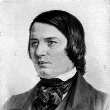VIDEO
Joshua Bell Plays Schumann’ s Träumerei
BẤM HÌNH DƯỚI: XEM & THƯỞNG THỨC
Nhớ bấm góc phải để coi Màn Hình Lớn
[Please watch Full Screen]
Träumerei = Dreaming = Rêverie


Robert Schumann was a German composer of the Romantic period, best known for short piano pieces, songs, and concertos. He was one of the most important music critic of his day. Felix Mendelssohn championed many of his works.
Robert Alexander Schumann (June 8, 1810 – July 29, 1856), was born in Zwickau, the son of a book publisher. He started piano lessons at six years old. Among his piano works, Carnaval and Kinderscenen from “Scenes from Childhood” are most popular.
Early on, Robert Schumann showed ability as a pianist, and an equal love for music and literature. For this reason, many of his compositions are linked to characters or scenes from play, novels and poems. This doesn’t come as a surprise for Schumann’s father was a bookseller, author, and publisher.
At the age 13, the young Robert already wrote his first articles printed by his father. In 1821 he went to Leipzig to study law but instead spent his time in musical, social and literary activities. He wrote some piano music and took lessons from Friedrich Wieck.
By 1835 he was in love with piano virtuoso Clara Wieck, the young daughter of his music-instructor Wieck who developed into a musician of consummate artistry. Wieck did his best to separate them. After many trials, Schumann and Clara were able to marry in 1840. The couple had eight children and Clara continued her career as concert pianist, at times, more popular than her husband of which he was painfully aware.

Träumerei [Dreaming] is one of Schumann’s best known pieces. It was the title of a 1944 German biographical film on Robert Schumann. Träumerei is the love song for Robert and Clara Schumann in the 1947 Hollywood film Song of Love, starring Katharine Hepburn as Clara Schumann Wieck.
Kinderszenen (original spelling Kinderscenen, “Scenes from Childhood”), Opus 15, by Robert Schumann, is a set of thirteen pieces of music for piano written in 1838. In this work, Schumann provides us with his adult reminiscences of childhood. Schumann had originally written 30 movements for this work, but chose 13 for the final version. Robert Polansky has discussed the unused movements.
Schumann had originally labeled this work Leichte Stücke (Easy Pieces). Likewise, the section titles were only added after the completion of the music, and Schumann described the titles as “nothing more than delicate hints for execution and interpretation”. Timothy Taylor has discussed Schumann’s choice of titles for this work in the context of the changing situation of music in 19th century culture and economics.
DAHA











































One Comment
Chu Việt
On YouTube, Joshua’s sounds are not well defined and sometimes overwhelmed by cellos’ background accompaniments. His habit of moving his head to and fro also distracts from the audience’s attention. I like Misha Elman’s gentle rendition better.
All in all, perhaps this piece is better heard on keyboard, to witness Horowitz’ emotional evocation among Moscow’s audience.